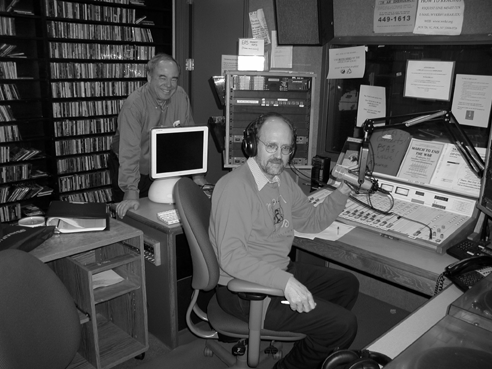Inner Vision: Spiritually Speaking
[]
Rena Blumenthal, Dave Belden, and I got to know each other with hands curled around mugs of tea and shoes kicked off, nestled in comfy couches in the Bayit, Vassar College’s Jewish student center. Our conversation drifted from the culture of religion to the politics of religion and back again. It’s that kind of cozy exploration that sets the tone for “Spiritually Speaking,” a radio show about religion and politics that Blumenthal and Belden cohost along with Reverend Jim Bridges on Vassar’s radio station, WVKR.
Blumenthal, Belden, and Bridges hadn’t met until they started “Spiritually Speaking” last summer. A colleague from the local chapter of Spiritual Progressives came up with the concept for the radio show. Spiritual Progressives, in which each of the hosts participates, is a nationwide interfaith organization that promotes social change based on a moral agenda other than that of the Christian right. That colleague connected the three to make her idea a reality. Each week the show brings on a different guest, picking and choosing from a variety of religious bents. The hosts chat with the guest for a full hour, trying to get at the guest’s belief system and how it informs his or her life.
The show’s target audience is liberals who are having a hard time reconciling political and spiritual ideas. In essence, the hosts are reaching out to people like themselves. Each was raised in organized religion, but then stayed away from religious communities for the first 20-some years of adulthood. And each has since returned to explore spirituality in a serious way—while maintaining liberal political views.
Blumenthal grew up in an orthodox Jewish family. At the age of 17, she decided she didn’t believe in God. Over the next two decades she became a psychologist, helping her patients without tapping into spirituality. But when she was 39, Blumenthal started thinking in religious terms again.
“What had turned me away from religion was [in fact] alienating me from something that felt essential and starved,” Blumenthal said. To appease her spiritual hunger, Blumenthal went back to school—rabbinical school. She joined Reconstructionist Judaism, a modern movement within the religion. Now, she has developed her faith as a rabbi and counsels Jewish students at Vassar College.
Belden grew up in England as a member of the Oxford Group, with its Christian-based spirituality embracing honesty, purity, unselfishness, and love as its core values. He has since come back to a belief system as an agnostic member of the Unitarian Universalist church. He’s a freelance writer, penning corporate literature and religious articles. He thinks many liberals who are spiritual separate their political and religious identities.
“I come from the left, and I know many people who are into spirituality. But these two things tended to be very private and individual,” Belden said. “They haven’t had a language for expressing it in the public sphere.”
Belden thinks that’s a key difference between the religious left and the religious right. Conservative Christians run more than 2,000 Christian music and talk stations nationwide—many of which run political shows. With “Spiritually Speaking,” Belden and his co-hosts are hoping to provide some of that language for liberals.
On Halloween, they invited a Wiccan “witch” named Rowan onto the show, asking her about her spirituality and practice. When she talked about spells, it sounded uncannily like the prayers of other religions. “I surround myself with symbols and things that appeal to all my senses—all those things that get you into the right space,” Rowan said. “I do some symbolic acts. It’s really all about focusing your intention on the change you want to make. I don’t know what happens in the outside world, but it affects you.”
“Spiritually Speaking” has hosted a panoply of religious thinkers. Past guests include Rev. Bob Edgar, General Secretary of the National Council of Churches, and Randall Balmer, professor of American religion at Barnard College. Some are more secular than others. Bridges invited two members of Planned Parenthood on the show one week to explore the politics and spirituality behind family planning. “They were excellent in talking about the field. The job itself was their own sense of spirituality.” He notes, though, that connections between their job and a fuller, deeper sense of spirituality became obvious as the show continued. “So maybe it was even better for them than it was for the audience.”
Bridges is a minister at two Unitarian Universalist congregations, one in Orange County and the other in northern Pennsylvania. It’s a strain on his schedule to work both of those jobs and fit in the radio show. But he thinks it’s worth it. “I’m hoping to reach people who are religious, but haven’t thought about how religion could inform their political action,” he said. “And people who haven’t thought much about either—I’m hoping to deconstruct their hostility toward religion. Don’t assume that if you’re religious you’re hurting things, or are anti-gay or anti-war. That’s just not true.”
Throughout history, liberal religious leaders have spearheaded political movements, Bridges points out. Belden and Blumenthal agree. Quaker abolitionists set up the Underground Railroad. Black ministers inspired acts of civil disobedience. Female suffragettes grounded the women’s rights movement through their religious organizations.
Now, Spiritual Progressives are seeking to nurture political activism among religious liberals. An interfaith group with roots in liberal Judaism, Spiritual Progressives lays out three tenets of belief. First, that governments and institutions should focus on ethics and peace instead of money and power. Second, that state that groups on the religious right have misused religion, God, and spirit. Third, members antireligious assumptions made by many liberals, saying they will reach out to those liberals and encourage them to think about spirituality.
As an agnostic, Belden thinks people sometimes return to belief systems in search of community. That’s why he started attending Unitarian Universalist church. He and his wife wanted to find a community for their son. But then, the spiritual stuff started trickling through. “I think religion is in the business of ‘hope management.’ Is the world a positive place or a random act?” he asked. “We desperately need a realism of hope, love, and faith with a lowercase f—just the faith that we can get through global warming and have a sustainable society. Lots of people are losing that hope.”
The hosts of “Spiritually Speaking” wonder how many people are listening to their show. The WVKR signal touches five states: New York, Pennsylvania, New Jersey, Massachusetts, and Connecticut. “Spiritually Speaking” has a timeslot on Tuesday nights at 4pm, just before “Democracy Now!,” a popular left-leaning interview show on the station.
The show got a few calls during an on-air fundraiser in the fall, which Bridges found somewhat encouraging. But Belden hopes that it can go higher-profile and perhaps become syndicated on Christian stations as a token leftist show. Belden would be willing to go on Clear Channel, for example. The hosts feel they are helping to fill a void in talk radio.
“We’re not balancing the Christian right, but at least we’re holding up the possibility of something else,” Bridges said.













